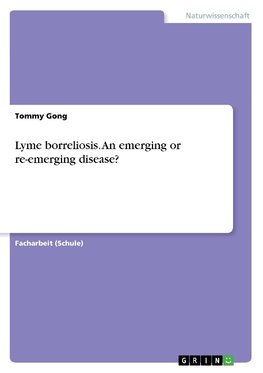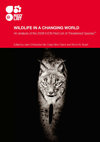
-
 Nemecký jazyk
Nemecký jazyk
Lyme borreliosis. An emerging or re-emerging disease?
Autor: Tommy Gong
Facharbeit (Schule) aus dem Jahr 2016 im Fachbereich Biologie - Krankheiten, Gesundheit, Ernährung, , Sprache: Deutsch, Abstract: Diseases are lethal abnormal conditions of the body which stops it from functioning completely or partially. Diseases are separated... Viac o knihe
Na objednávku
13.95 €
bežná cena: 15.50 €
O knihe
Facharbeit (Schule) aus dem Jahr 2016 im Fachbereich Biologie - Krankheiten, Gesundheit, Ernährung, , Sprache: Deutsch, Abstract: Diseases are lethal abnormal conditions of the body which stops it from functioning completely or partially. Diseases are separated into two different categories, infectious disease and non-infectious disease. Infectious diseases are diseases that can be transferred to another person through methods of direct or indirect contact. Non infectious diseases, on the other hand, cannot be transferred and can be due to lifestyle and environmental factors or genetics.
Emerging infectious diseases refers to a pathogenic disease that arose recently in a population for the first time. Re-emerging infectious diseases, however, are diseases that were once a major health problem but has declined due to reasons such as cures being developed. But the pathogen that caused the disease has rearose in a different form that is immune to its original cure.
Pathogens are biological agents that infects its hosts and causes disruption of its normal physiology through diseases. Pathogens are separated into different categories such as bacteria, viruses, fungi, protozoa, prions and macro parasites. Each of these different types of pathogens have their own ways of transmission, infection, survival in the host and reproduce. In order for a pathogen to be successful, it needs to avoid the host's immune system long enough to infect a new host. There are many ways pathogens are transmitted amongst humans such as skin contact, contact of bodily fluids, airborne transmission and vector-borne transmission.
Pathogen transmission is efficient and successful in high density populated areas as the pathogens can be easily transmitted from person to person. After pathogens have entered the human body, they begin to multiply. The immune system of the host will respond to the foreign organism by sending out white blood cells and antibodies which functions to rid the pathogens either by directly attacking it or using other mechanisms such as raising the body temperatures which helps rid the viruses as the body becomes a less favorable host. However, some pathogens are able to evade the immune system and continue to cause diseases. The focus of this research, Lyme disease is an example of this.
- Vydavateľstvo: GRIN Verlag
- Rok vydania: 2016
- Formát: Paperback
- Rozmer: 210 x 148 mm
- Jazyk: Nemecký jazyk
- ISBN: 9783668359444

 Anglický jazyk
Anglický jazyk 










